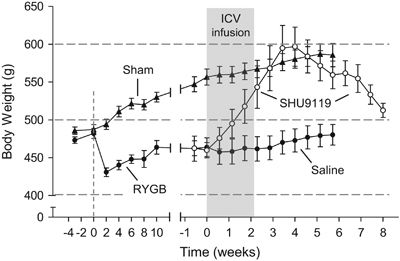International Journal of Obesity Supplements Pub Date : 2016-11-16 , DOI: 10.1038/ijosup.2016.9 Z Hao , M B Mumphrey , C D Morrison , H Münzberg , J Ye , H R Berthoud

|
The relatively stable body weight during adulthood is attributed to a homeostatic regulatory mechanism residing in the brain which uses feedback from the body to control energy intake and expenditure. This mechanism guarantees that if perturbed up or down by design, body weight will return to pre-perturbation levels, defined as the defended level or set point. The fact that weight re-gain is common after dieting suggests that obese subjects defend a higher level of body weight. Thus, the set point for body weight is flexible and likely determined by the complex interaction of genetic, epigenetic and environmental factors. Unlike dieting, bariatric surgery does a much better job in producing sustained suppression of food intake and body weight, and an intensive search for the underlying mechanisms has started. Although one explanation for this lasting effect of particularly Roux-en-Y gastric bypass surgery (RYGB) is simple physical restriction due to the invasive surgery, a more exciting explanation is that the surgery physiologically reprograms the body weight defense mechanism. In this non-systematic review, we present behavioral evidence from our own and other studies that defended body weight is lowered after RYGB and sleeve gastrectomy. After these surgeries, rodents return to their preferred lower body weight if over- or underfed for a period of time, and the ability to drastically increase food intake during the anabolic phase strongly argues against the physical restriction hypothesis. However, the underlying mechanisms remain obscure. Although the mechanism involves central leptin and melanocortin signaling pathways, other peripheral signals such as gut hormones and their neural effector pathways likely contribute. Future research using both targeted and non-targeted ‘omics’ techniques in both humans and rodents as well as modern, genetically targeted, neuronal manipulation techniques in rodents will be necessary.
中文翻译:

胃搭桥手术会改变体重设定点吗?
成年期相对稳定的体重归因于大脑中的一种稳态调节机制,该机制利用人体的反馈来控制能量的摄入和消耗。这种机制保证了,如果因设计受到干扰而使体重下降,体重将恢复到摄动前的水平,即被定义为防御水平或设定点。节食后体重会重新增加的事实表明,肥胖的受试者可以维持较高的体重水平。因此,体重的设定点是灵活的,并且可能由遗传,表观遗传学和环境因素的复杂相互作用决定。与节食不同,减肥手术在持续抑制食物摄入和体重方面做得更好,并且已经开始深入研究其潜在机制。尽管对这种特别的Roux-en-Y胃旁路手术(RYGB)这种持久作用的解释是由于侵入性手术导致的简单的身体限制,但更令人兴奋的解释是该手术在生理上重新编程了体重防御机制。在本次非系统评价中,我们提供了来自我们自己和其他研究的行为证据,这些证据证明RYGB和袖胃切除术后可减轻体重。经过这些手术后,如果一段时间内饲喂过量或不足,啮齿动物将恢复其首选的较低体重,并且在合成代谢阶段大幅增加食物摄入的能力强烈反对身体限制假说。但是,基本机制仍然不清楚。尽管该机制涉及中央瘦素和黑皮质素信号传导途径,其他外围信号(例如肠激素)及其神经效应途径也可能起作用。将来有必要在人类和啮齿动物中使用靶向和非靶向“组学”技术以及啮齿动物中现代的,具有基因靶向性的神经元操纵技术进行研究。



























 京公网安备 11010802027423号
京公网安备 11010802027423号